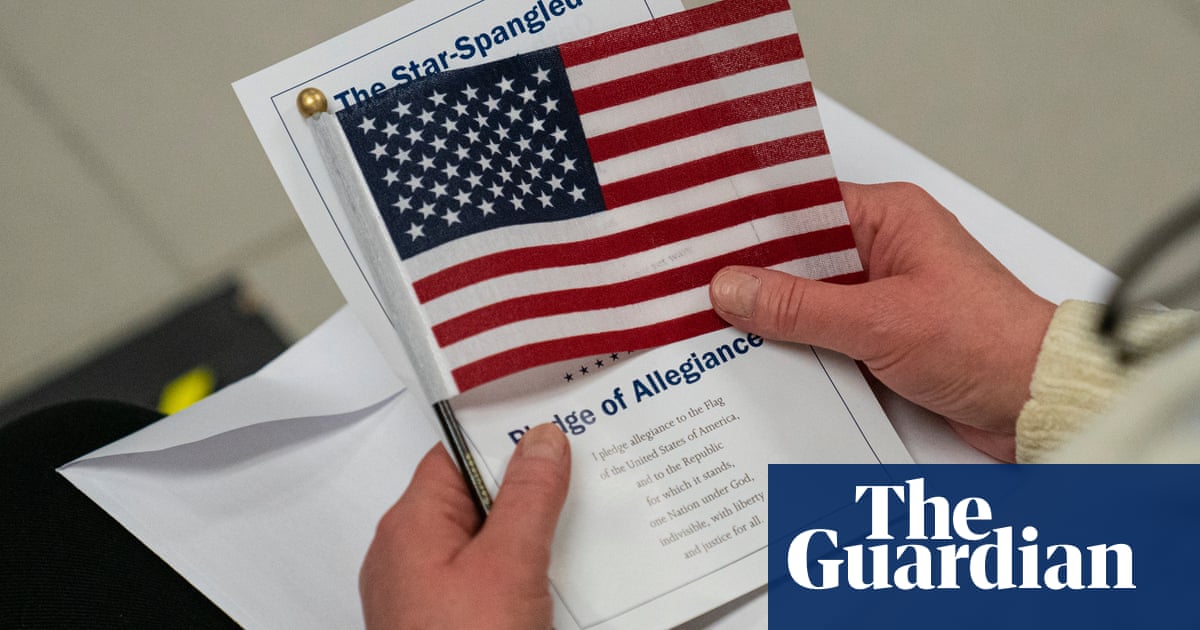TheTrump administrationhas codified its efforts to strip some Americans of their US citizenship in a recently published justice department memo that directs attorneys to prioritize denaturalization for naturalized citizens who commit certain crimes.
The memo,published on 11 June, calls on attorneys in the department to institute civil proceedings to revoke a person’s United States citizenship if an individual either “illegally procured” naturalization or procured naturalization by “concealment of a material fact or by willful misrepresentation”.
At the center of the move are the estimated 25 million US citizens who immigrated to the country after being born abroad, according todata from 2023– and it lists 10 different priority categories for denaturalization.
According to the memo, those subjected to civil proceedings are not entitled to an attorney like they are in criminal cases. And the government has a lighter burden of proof in civil cases than they do in criminal ones.
The memo claims such efforts will focus on those who are involved “in the commission of war crimes, extrajudicial killings, or other serious human rights abuses … [and] naturalized criminals, gang members, or, indeed, any individuals convicted of crimes who pose an ongoing threat to the US”.
The directive gives justice department attorneys wider discretion on when to pursue denaturalization, including in instances of lying on immigration forms, cases where there is financial fraud or medical fraud against the US or against private individuals; and cases referred by a US attorney’s office or in connection with pending criminal charges.
The justice department’s civil rights division has been placed at the forefront of Trump’s policy objectives, including ending diversity, equity and inclusion (DEI) programs within the government as well as ending transgender treatments, among other initiatives.
That comes as the US’s Immigration and Customs Enforcement (Ice) agency registered its 13th in-custody death for the fiscal year beginning in October 2024. There had been 12 such deaths during the entire fiscal year that finished at the end of September 2024.
On Friday Jim Ryan, president of the University of Virginia, resigned amid an investigation by the justice department’s civil rights division. The investigation took aim at the university’s DEI programs and its continuing to consider race and ethnicity in various programs and scholarships.
The justice department also took the unusual step in recent days of suing 15 US district attorneys in Maryland over an order blocking the immediate deportation of migrants challenging their removal.
The justice department’s civil rights division is reportedly in disarray as its traditional mission – to combat racial discrimination after the civil rights movement – is reshaped by priorities stemming from the president’s executive orders. About 250 attorneys – or 70% of the division’s lawyers – were believed to have left the department in the time between January and the end of May,according to a recent National Public Radio (NPR) report.
Sign up toThis Week in Trumpland
A deep dive into the policies, controversies and oddities surrounding the Trump administration
after newsletter promotion
The memo’s focus on denaturalization comes as at least one person has been denaturalized in recent weeks.
On 13 June, a judgeordered the revocationof the citizenship of Elliott Duke. Duke is a US military veteran originally from the UK who was convicted for distributing child sexual abuse material and had not disclosed the crime during the naturalization process.
Immigration attorneys are concerned that denaturalization cases via civil litigation strips some rights from the individual, including rights to an attorney as well as lowering the threshold of proof, and speeding up the denaturalization process.
“It is kind of, in a way, trying to create a second class of US citizens,” said Sameera Hafiz, policy director of the Immigration Legal Resource Center,to NPR.
